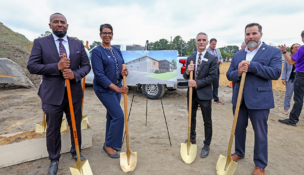McAuliffe asks business community to push Medicaid expansion
McAuliffe asks business community to push Medicaid expansion
Gov.-elect Terry McAuliffe urged business leaders on Thursday to help expand Medicaid coverage in Virginia.
McAuliffe, who endorsed Medicaid expansion in his campaign, said giving more people access to health care is a necessary step in maintaining a productive workforce.
“If Medicaid expansion is not the business community’s No. 1 priority with the General Assembly, it will not happen,” he said during an economic conference in Williamsburg. “You need to make the case to the legislators yourself that this is the right decision for our economy and our families.”
The conference was sponsored by the Virginia Chamber of Commerce, which used the occasion to present McAuliffe with a comprehensive economic plan, Blueprint Virginia.
The plan, compiled during the past year with input from 300 organizations and 7,000 participants, recommends a wide range of improvements in areas such as health care, workforce training, education, economic development, transportation, energy and environmental protection.
A 24-page executive summary of the plan calls on the commonwealth to implement “Medicaid reform and expansion to help reduce cost shifting onto insured patients and employers for the cost of treating the uninsured.”
A bipartisan legislative panel currently is debating the expansion of Medicaid in Virginia as part of the federal Affordable Care Act. (ACA).
Richmond-based political analyst Bob Holsworth, a speaker at the Williamsburg event, said Medicaid expansion in Virginia may be difficult to achieve in a divided legislature amid rising criticism of the botched ACA rollout.
He suggested that McAuliffe might be more successful in finding common ground with Republican legislators, who control the House of Delegates, on other Blueprint Virginia priorities such as improving workforce development and reforming state Standards of Learning (SOL) tests.
In formally accepting the Blueprint Virginia plan, however, McAuliffe made his case for expanding Medicaid. “This is both an economic development issue and a workforce issue. Why? Because most of Virginia's 1 million uninsured … are members of the workforce.”
About 400,000 of the commonwealth's uninsured residents would be eligible for health coverage in a Medicaid expansion.
Noting that the federal government is expected to pay 100 percent of the cost of the expansion for the first three years, McAuliffe said the move would create 33,000 jobs and “bring $21 billion back to the state. I don't think we should use our Virginia tax dollars to provide health care for other states.”
“We can’t have the best workforce in the world if one eighth of our people are accessing health care through emergency rooms,” McAuliffe said, adding that he would assign Lt. Gov.-elect Ralph Northam to work on Medicaid expansion.
In addition to calling for expansion of Medicaid, the Blueprint Virginia plan stresses the importance of a cost-effective health care, urging a “focus on population health as it is among Virginia’s weakest attributes” on Virginia Performs, a website that tracks the commonwealth’s ranking on a variety of measurements.
In workforce training and education, the plan calls for the creation of a new Virginia Workforce Industry Council to provide input on the needs of the business community in workforce decisions.
The plan says the commonwealth will need 2 million new workers to support its growth over the next 10 years. State leaders must recognize “that a highly talented and educated workforce is the lynchpin of maintaining and elevating Virginia’s economic competitiveness,” the plan says.
The blueprint suggests using private-sector expertise in redesigning curricula and developing training programs for both technical and “soft” skills.
The plan stresses the need to use the Virginia Community College System as the “gateway” for post-secondary education and workforce training for high school graduates and mid-career adults.
In addition, Blueprint Virginia calls for a greater focus on early childhood education and more flexibility in state funding for at-risk preschoolers.
In transportation, the plan cautions the governor and legislature to be careful in using money provided by a landmark bill passed last year. “Advance a transportation policy approach that focuses on corridors of regional and statewide significance and strategic investments that have the greatest impact on performance and safety.”
Looking at the Virginia’s energy needs, the plan encourages the use of diverse energy sources including coal, natural gas, nuclear, biomass, solar and wind.
In economic development, the plan supports a comprehensive study of Virginia’s tax structure and urges continued infrastructure investments to strengthen international trade.
i


















